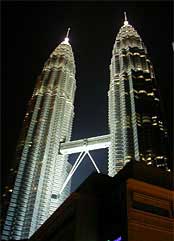 Kuala
Lumpur Kuala
Lumpur
More than any other spot in the country, Kuala
Lumpur, or "KL" as it is commonly known, is
the focal point of new Malaysia. While the
city's past is still present in the evocative
British colonial buildings of the Dataran
Merdeka and the midnight lamps of the Petaling
Street nightmarket, that past is everywhere
met with insistent reminders of KL's present
and future. The city's bustling streets, its
shining, modern office towers, and its
cosmopolitan air project an unbounded spirit
of progress and symbolize Malaysia's
unhesitating leap into the future. To some,
this spirit seems to have been gained at the
loss of ancient cultural traditions, but in
many ways KL marks the continuation rather
than the loss of Malaysia's rich past. Like
Malacca five hundred years before, KL's
commercial centre is a grand meeting place for
merchants and travelers from all over the
world.
In the same way, the city brings together
Malaysia's past and present, its many
constituent cultures, and even its remarkable
natural treasures, allowing first-time
visitors an invaluable opportunity to see
Malaysia as a whole before setting off to
explore its parts. In the botanical and bird
parks of the Lake Gardens one is treated to a
first glimpse of the unsurpassed beauty and
variety of Malaysia's plants and animals. In
the vibrant Central Market, music, crafts, and
cultural practices from Kelantan to Sarawak
can be explored and experienced. And in the
National Museum, the dizzying multiplicity of
Malaysia's cultural history comes into focus.
As the entry point for most visitors and the
meeting point of the country's many
attractions, Kuala Lumpur is a grand gateway
to a fascinating destination.
 Sarawak
Museum Sarawak
Museum
The Sarawak Museum, located in Jalan Tun Abang
Haji Openg, is one of Asia's finest. It houses
a collection of Bornean ethnological and
archaeological items and an exhibition
featuring a reconstruction of the great Niah
Caves, with remains of the Neolithic people
who lived in the Caves. Closed on Fridays and
public holidays.Sandakan
Sandakan is busy port on the Sulu Sea, about
386 km from Kota Kinabalu. The forestry
exhibition in Sandakan showcases the
astounding variety of flowers and plants found
in Sabah; the Sandakan Orchid House has a
collection of rare orchids. Along the Labuk
Road from Sandakan is a crocodile farm,
housing about 1,000 crocodiles of various
sizes.
Gomantong Caves
The journey to the Gomantong Caves takes a
whole day; first a boat-ride across the bay
from Sandakan, then a drive by landrover
through 16 km of dense jungle. Within the
marvellous caves, swifts build their nests
high on cave walls and roofs. These nests are
considered a delicacy, and are carefully
collected by native men climbing on tall
bamboo poles. Tours can be arranged through
the Forest Department in Sabah or a travel
agency.
Semporna
Located on the southeast coast of Sabah,
Semporna is the jumping-off point for Pulau
Sipadan, a diving paradise, and Pulau Gaya,
the island where Sabah pearls are cultured.
Kudat
A long way from Kota Kinabalu (238 km),
Kudat is, nevertheless, worth a visit, as it
is home to the colourful Rungus tribe. The
journey to the village is an attraction in its
own right, winding through the region's varied
terrain of mountains, valleys, and jungles.
Sabah State Mosque, Kota Kinabalu
This resplendent structure, with its
majestic domes and gold inlay motifs, is a
spectacular sight, ideally located as a place
of worship for Kota Kinabalu's Muslim
inhabitan3ts and visitors.
Sabah Foundation Building, Kota Kinabalu
The 30-story circular glass building,
supported by high tensile steel rods emanating
from a central building, is an architectural
and engineering feat. It is one of only four
such buildings in the world.
Kota Belud
Kota Belud is a small town located 77 km
from Kota Kinabalu. Every Sunday it comes
alive in a scene of blazing, riotous colour
when the "Tamu," or open market, takes place.
Tuaran
Tuaran is the location of the region's
agricultural station. Nearby is Mengkabong, a
Bajau village built over water. Also close by
is Tamparuli, a town specializing in the
production of local handicrafts.
Penampang
Another village that offers an insight
into Sabah's varied ethnic groups, Penampang
is home to the Kadazan people. The village is
located 13 km south of Kota Kinabalu.
|